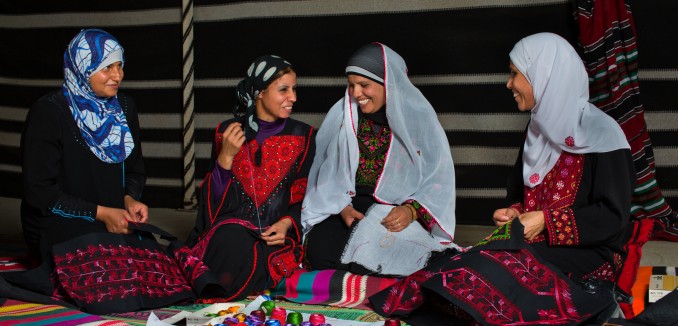On the first floor of a mosque in the Bedouin Arab village of Hura, 30 women with headphones over their brightly colored headscarves are providing customer service to clients of Bezeq, Israel’s largest telecom.
Zainab, 21, smiles and gently caresses her pregnant belly as she prepares to handle the next call in Hebrew or Arabic, just as any other Bezeq customer rep would do. The customer would never guess she is working inside a Muslim house of worship in the Negev.
Zainab and her coworkers wouldn’t be here if not for Bezeq’s cooperation with the Israeli Ministry of Economy’s unique employment service for Arab, Bedouin, Druze and Circassian citizens. When she finished high school, Zainab did not know Hebrew or computers and had few employment opportunities. Here, she tells ISRAEL21c, she has room for advancement and earns enough money to attend weekend college classes.
Bedouin women traditionally tend house and children, resulting in high unemployment and poverty. Though the Israeli government is investing billions of shekels in employment initiatives for the general Arab and haredi (ultra-Orthodox) sectors – those least represented in the Israeli workforce – extra attention is focused on Arab women since they have the lowest employment rate of all Israeli populations.
The Economy Ministry partnered with the Joint Distribution Committee-Israel (JDC) to open Arab-run Rayan Employment Centers in the northern and southern peripheries beginning in 2012. The coaching, training and job-placement centers will number 21 by year’s end, serving 63 municipalities.
The existing 19 centers have received about 17,000 clients, more than half of them women, and have placed 9,100 clients as call-center operators, clerks, cashiers, farm or factory workers, childcare providers, receptionists and secretaries. Others have gotten assistance starting businesses or qualifying for college admission. About 1,000 Arab women have become entrepreneurs with the help of the Israel Small and Medium Business Agency and micro-financing programs.
“Many [Bedouin] women need to have local employment solutions, so we help them start small businesses such as cosmetics, catering and family daycare,” says Mahmud Alamour, Rayan South Director General.
The Rayan centers address the remaining barriers in an effort to reach the government’s target of having 300,000 Israeli Arabs – one-third of them female — in the workforce by 2020. Of about 220,000 Bedouins in the Negev, 43,000 are women of working age.
[Photo: Israel_photo_gallery / Flickr ]




